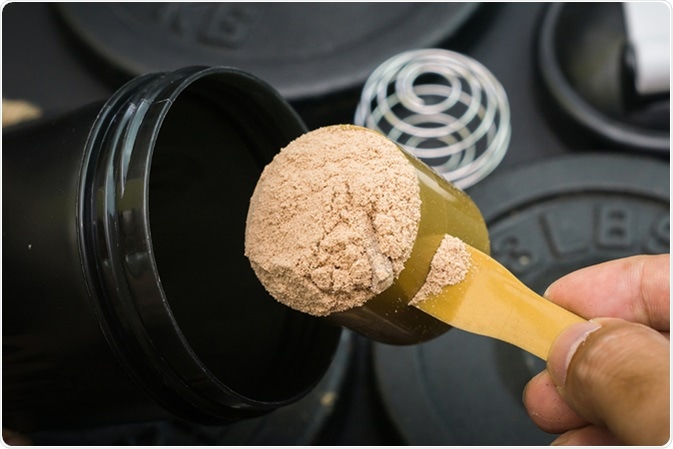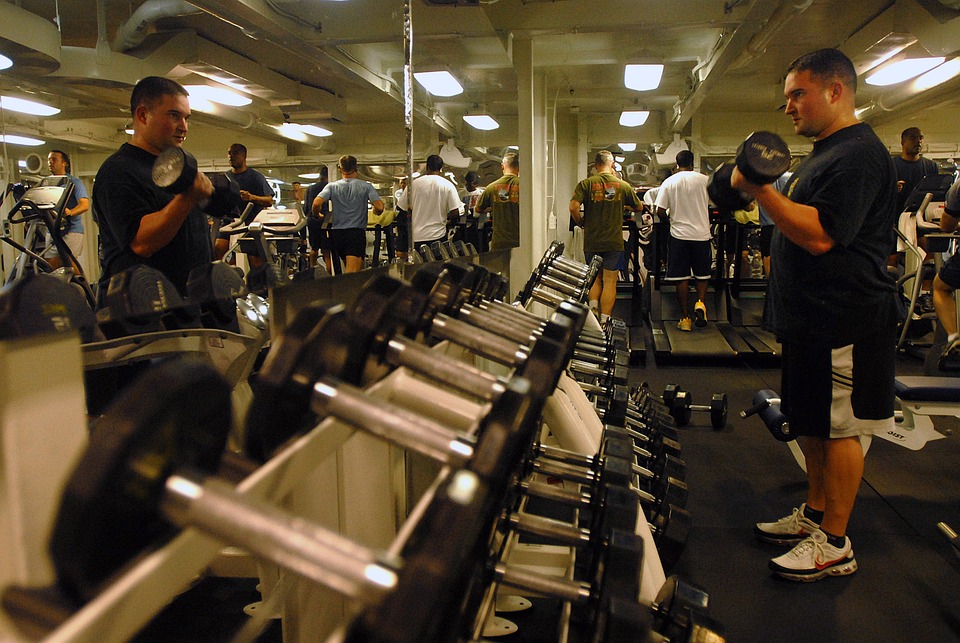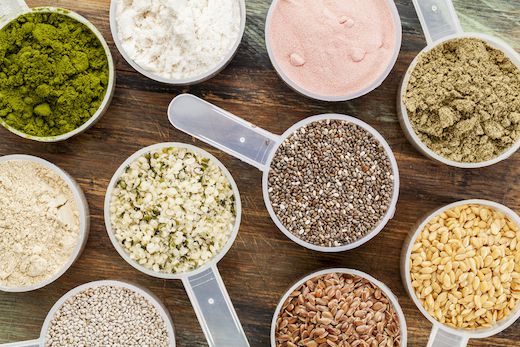Protein is an important macronutrient in helping repair tissue, create enzymes and hormones, and build muscle. Consuming protein powder may even help in weight loss and in toning muscles.
Protein is an important macronutrient in helping repair tissue, create enzymes and hormones, and build muscle. Consuming protein powder may even help in weight loss and in toning muscles.
Protein powders have been trending among health-conscious individuals for quite some time now. Protein is an important macronutrient in helping repair tissue, create enzymes and hormones, and build muscle. Consuming protein powder may even help in weight loss and in toning muscles.
There are various types of protein powders sold today. But before we discuss them, let’s first understand what protein powders are.

Protein powders are supplements containing concentrated amounts of protein from plant or animal foods like rice, dairy, peas, or eggs.
There are three common forms of protein powders:
Hydrolysates have been found to increase insulin levels better than other types, at least when it comes to whey protein. This action can improve muscle growth following exercise.
Some powder types are also enhanced with vitamins and minerals, especially with calcium.
However, not all people can benefit from protein powders. People following a diet that is rich in quality protein will not experience significant changes in their quality of life by taking protein powder.
But athletes and individuals who regularly lift weights could find that consuming protein powder contributes to maximising fat loss and muscle gain.

Protein powders can also help people who have a hard time meeting their daily protein requirements through food alone. These include people who are sick, older adults, and some vegans and vegetarians.
These are the different types of protein powder sold today.

Whey protein is obtained from milk. It is the liquid substance that is separated from the curd when making cheese. Whey is high in protein but it also contains lactose, a sugar in milk that some people find difficult to digest.
Although whey protein concentrate contains some lactose, its isolate variant contains tiny amounts due to most of the milk sugar being eliminated during processing.
Whey is metabolised quickly by the body and is high in branched-chain amino acids (BCAAs). One of the BCAAs known as leucine plays an important role in contributing to muscle growth and recovery after endurance and resistance training.
When amino acids are taken and absorbed in the bloodstream, they become readily available for muscle protein synthesis, which is the development of new muscle.
Studies have shown that whey protein can help in building and maintaining muscle mass to assist athletes in recovering from heavy exercise. Researchers also learned that it increases muscle strength as a response to strength training.
In one study, whey protein was found to have increased MPS by 31% more compared to soy protein and 132% more than casein protein after resistance training.
Meanwhile, other studies involving normal, overweight, and obese individuals hint that whey protein could be used to improve body composition by reducing fat mass and improving lean mass.
Furthermore, whey protein appears to lower appetite at least similar to other types of protein.
Some studies have also shown that whey protein could reduce inflammation and enhance certain heart health markets in obese and overweight individuals.

Similar to whey, casein is also obtained in milk yet it is absorbed slower by the body.
Casein develops into a gel once it interacts with acid in the stomach, slowing the stomach emptying process and delaying the absorption of amino acids into the bloodstream.
This action results in a gradual exposure of muscles to amino acids, lowering the rate of muscle protein breakdown.
Studies indicate that casein is more effective in improving MPS and strength compared to wheat and soy protein.

Another excellent source of quality protein is eggs. Out of all whole foods, eggs have been shown to provide the top protein digestibility-correct amino acid score (PDCAAS). This score indicates the digestibility and quality of a protein.
Additionally, eggs are among the best foods in lowering appetite while helping people stay full longer.
However, the egg protein powders you find as supplements are often made with just egg whites. Although the quality of protein remains high, people may feel less fullness due to the removal of the high-fat yolks.
Just like all animal products, eggs are considered a complete source of protein. This means that they supply the body with all nine essential amino acids that it cannot create.
Consuming egg white protein supplements may be a great choice for people who are allergic to dairy products but still want an animal-based form of protein.

Pea protein powder is a popular option for vegetarians, vegans, and people who are allergic to eggs or dairy. This type of powder is made using yellow split pea, which is a high-fibre legume that contains all but one essential amino acid. Pea protein is rich in BCAAs as well.
In men performing resistance exercises, those who consumed 50 grams of pea protein each day experienced increases in muscle thickness similar to those who consumed whey.
Additionally, another study showed that subjects with high blood pressure were observed to have reduced blood pressure when they consumed pea protein supplements.
Although it looks promising, more studies need to be done in order to confirm the potential benefits of pea protein powder.

Another supplement based on plants that are quite popular nowadays is hemp protein powder. Although related to marijuana, it only has trace amounts of the psychoactive substance THC or none at all.
Hemp is known for being rich in beneficial omega-3 fatty acids including other essential amino acids. However, scientists do not consider it a complete protein since it has low levels of leucine and lysine.
Although there is only little research on hemp protein, it seems that this type of supplement is easily absorbed by the body.

Protein powders extracted from brown rice have been available for quite some time but are usually considered inferior in developing muscle than whey protein. Although it has all of the essential amino acids, its low lysine content does not make it a complete protein.
There is not much research concerning rice protein powder, yet one study analyzed its effects on whey powders in young men.
The study showed that consuming 48 grams of whey or rice protein each day resulted in the same changes in terms of body composition, recovery, and muscle strength in the subjects.

Other protein powder supplements are made using a combination of plants to provide the body with the essential amino acids it needs. Proteins from two or more of these plants are often combined:
The high fibre content of these plant proteins makes them slower to digest compared to animal proteins. Although this is not a problem for most individuals, it can reduce the amino acids the body can use right away after a workout.
In one small study, young men were given 60 grams of whey protein, pea-rice combination, or a pea-rice protein blend with additional enzymes to help with digestion. The results showed that the outcome was similar to whey protein with regards to the speed wherein the amino acids showed up in the blood.
People consume protein powders for several reasons, including weight loss, recovery, and muscle gain. Although many foods provide sufficient amounts of protein, protein powders have become quite popular due to being a high-quality source of this macronutrient.
But do these supplements work and can they provide the results we seek? Let’s read on to find out.
According to the Food and Drug Administration, products that contain dietary ingredients like minerals, vitamins, herbs, and amino acids are considered dietary supplements.
With that said, protein powders provide amino acids or the building blocks required by proteins.
There are many forms of dietary supplements ranging from liquids to powders to capsules. Although you may find protein shakes in ready-to-drink form, there are also protein supplements available in capsules or powders.
As the name implies, dietary supplements are intended to help users enhance or complete their diet. These protein powders can be very useful especially for people who have a hard time obtaining high-quality sources for their protein.
Initially, protein powders were consumed by gym enthusiasts and athletes who wished to increase muscle mass while improving their workout performance.
In fact, mixing protein powders with resistance exercises could enhance muscle growth and promote physical recovery and performance.

This occurs since resistance training promotes muscle protein synthesis, as does a heightened intake of top-quality protein.
As stated earlier, protein powders supply amino acids that are readily absorbed by the body. Researchers believe that such intake enhances amino acid levels in the blood, which then activates a higher response for muscle synthesis.
Furthermore, some studies hint that protein powders could help in retaining and potentially promoting muscle gain following a weight loss diet.
In one study that consisted of 40 male subjects, the results showed that those who consumed a high protein diet through protein supplements shed more fat mass while experienced increased muscle gain when included in strength and cardio workouts.
It is possible that protein powder shakes may help people achieve their fitness goals, specifically when they wish to gain muscle or lose fat.
Consuming diets high in protein can also result in increased energy expenditure in two unique ways.
The first is that the body burns up more calories by metabolising more proteins than fat or carb. This response to food is called diet-induced thermogenesis or DIT.
DIT is the one that indicates the amount of energy necessary to metabolise each nutrient relative to the amount of calories that were ingested. The values for protein range from 15 to 30% in comparison to 5 to 10% for carbs and 0 to 3% when it comes to fat.
The second is that high protein diets promote gluconeogenesis, which is the process of producing glucose from fats or proteins when carbs are absent. This action is believed to eliminate additional calories when triggered.
In fact, research on 10 healthy subjects reported increased energy expenditure when following a high protein diet compared to the control group. The results determined that 42% of this increase was caused by gluconeogenesis.
That is why increasing protein intake by consuming protein powders could help people take advantage of its metabolic effects.
Diets high in protein are known for promoting fat loss and fat oxidation. Evidence hints that increasing protein intake from quality sources like protein powders could be associated with fat loss in the midsection.
Losing fat located around the waist is particularly important. Increases in abdominal fat result in chronic inflammation, which has been associated with heart disease and insulin resistance.
In a study involving 37 women, subjects who consumed an additional 40 grams of whey protein each day resulted in a minor reduction in abdominal fat in comparison to those who had an inferior protein supplement.
In a similar study, subjects who had an extra 56 grams of whey protein each day experienced lower body weight by as much as 4 pounds and lower body fat by 5 pounds, compared to the control group.
Consuming protein powders may be beneficial in adding to any weight loss approach, yet these products are not the only aspect to consider when shedding weight.
People who wish to lose weight have to induce a negative energy balance. This means that they need to burn a higher amount of calories than what they consume. This is also called a calorie deficit.
There are three ways to accomplish a calorie deficit – either through increasing physical activity, consuming fewer calories, or both.
Although a higher intake of proteins allows a person to consume fewer calories without being hungry, protein is still made up of calories that add up to the per day total.
That is why eating too much of this nutrient can hinder your calorie deficit and even add up to the surplus. For instance, a study showed that individuals who followed a high protein diet then increased their calorie intake gained both fat and body weight.
That is why even though protein powder supplements can help lose weight, users still need to have their caloric equation in mind.
Since increasing physical activity could help improve calories expended, it is possible to try aerobic exercises or resistance training to add up to this.
However, research recommends that combining both is a more efficient approach in losing weight especially since cardio helps in achieving a pronounced weight reduction. Meanwhile, resistance training aids in improving or maintaining muscle mass.
A high protein diet is characterized by an intake of protein daily that is above the Recommended Dietary Allowance (RDA), which is 0.4 grams per pound. People who struggle in reaching these quantities by way of food can turn to protein powders and shakes.

However, those who are able to achieve this requirement through natural means may find these products unnecessary. Some great foods that are high in protein include soy, eggs, meat, milk, poultry, and fish.
Diets that are high in protein are ideal for developing muscle and losing weight. Protein powder supplements make it easier to increase protein intake.
Since these products can boost metabolism, control appetite, and lose belly fat, protein powders may be an effective approach for weight loss. Besides that, they also help increase muscle while improving performance when added with resistance exercises.
However, consuming enough foods that provide high-quality protein every day should make these supplements unnecessary. Also, remember that taking too much protein can eventually lead to gaining weight.
For those looking to give protein powders a try, there are many plant and animal-based protein powders sold in stores today to meet various needs.
Grass Fed Whey is a sugar free Whey Protein which comes from certified grass fed, hormone free cattle and contains zero artificial sweeteners.
Protein powders are an excellent way of incorporating additional protein into a diet, with research showing that it could be beneficial to people when losing weight. Having enough of this from your diet can improve metabolism, reduce appetite, and help the body shed fat without losing muscle.
Protein shakes are an excellent option for breakfast especially for people who are busy. Besides being easy, convenient, and nutritious, protein shakes are quite versatile. They can also be adjusted based on your specific preferences.
Despite the benefits we’ve learned about protein powders, not all of them are keto-friendly. Just like any product for people on a low-carb diet, you need to read the label closely to make sure you’re not consuming added carbs and sugars.